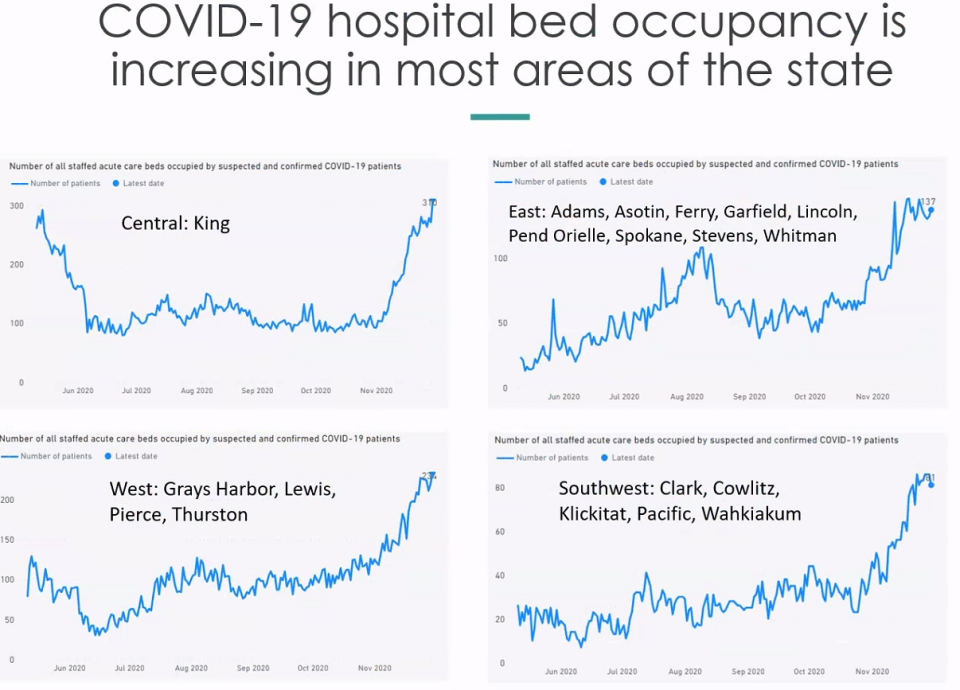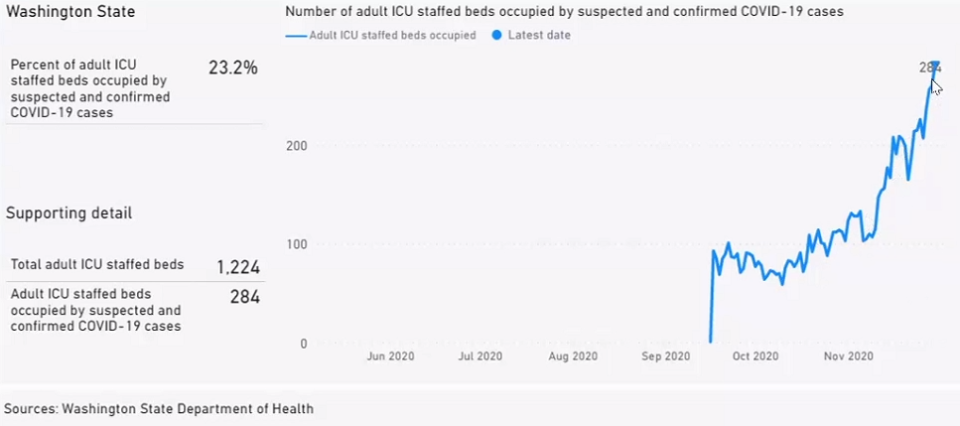Washington Prepares For 1st Shipments Of Coronavirus Vaccine
OLYMPIA, WA — Washington is finalizing preparations to receive the first 62,000 doses of the Pfizer coronavirus vaccine by mid-December, pending an emergency authorization from the U.S. Food and Drug Administration.
The news came at the Washington State Department of Health's weekly news briefing on the state of the pandemic Wednesday, providing the first detailed update since the Thanksgiving holiday.
Michele Roberts, who leads vaccine planning efforts in Washington, said 116 providers are now fully enrolled to administer the vaccine across the state, with many more applications pending approval.
"This means our numbers for confirmed enrollment have doubled since last week — excellent progress," Roberts said. "We're working hard to make sure every county has at least one provider."
All providers, including pharmacies, clinics and hospitals, that are enrolled by Dec. 6 will be eligible to receive the very first round of shipments. The state expects another 200,000 vaccines by the end of the month, and each patient will require two doses.
While health officials are still finalizing the complete prioritization plan, initial vaccines will be reserved for frontline workers and some of the most vulnerable groups.
In developing its plan, the state is consulting recommendations from the federal Advisory Committee on Immunization Practices (ACIP), along with input from community groups, health partners and industries most impacted by COVID-19.
"What we know for sure right now is the first phase of vaccination, called 1A, will focus on workers in health care settings that serve patients who either have confirmed or suspected COVID-19, along with staff and residents of long-term care facilities," Roberts said. "We'll know more about who will be vaccinated in later phases after we learn more about the future decisions of the ACIP."
One goal the state hopes to complete soon is providing a definitive metric for when all Washingtonians will be able to seek immunization.
"We are also working on tools to make it easier to figure out which phase you're in, so when you personally will be eligible to receive the vaccine," Roberts said. "This is a very exciting time for us, but there is still a lot of learning to be done. For example, further research is needed to understand how long this vaccine will protect us."
Strong start for 'WA Notify' coronavirus exposure app
Just two days after the state unveiled a coronavirus exposure notification app, more than 875,000 Washingtonians have downloaded the "WA Notify" app or enabled the feature in their smartphone settings, according to state Secretary of Health John Wiesman. That figure represents about 11 percent of the state's total population.
"I'm really excited to see those numbers," Wiesman said. "I encourage everyone who has a smartphone and has not yet enabled WA Notify to do so."
Pick up the phone or call back quickly if public health tries to reach you about #COVID19. Learn more about contact tracing here -> https://t.co/Sst9bEA5ua pic.twitter.com/L6r81TMJ5v
— WA Dept. of Health (@WADeptHealth) December 3, 2020
Wiesman said the app, which is voluntary and anonymous, is another tool to empower the state's contact tracing and case investigation efforts.
"If you have enabled WA Notify, and you get a notification that you may have been exposed, really get tested as soon as possible, follow the instructions, and for everyone who tests positive make sure to answer the call, or call right back, when public health reaches out to you."
Learn more about WA Notify on the state Department of Health website.
Record hospitalizations, high case counts and a growing number of deaths in Washington
Dr. Kathy Lofy, the state health officer, walked through the state's latest situation report Wednesday, as the number of hospitalizations and deaths resulting from COVID-19 continues to trend in the wrong direction.
Any potential effects of the Thanksgiving holiday, Lofy said, will likely take at least another week to appear due to the virus's incubation period and unpredictable patterns in testing over the long holiday weekend.
"Our epidemiological surveillance data is always difficult to interpret around the holiday weeks because people's health care-seeking behavior often changes," Lofy said. "It can be particularly hard to interpret case counts and percent positivity because we know that were a number of people before Thanksgiving who wanted to get tested just to see if they were infected but didn't have any symptoms. We also know that some people with mild illness may not be likely to go and get tested during the long weekend."
One thing that remains clear to health officials is that new hospitalizations are rapidly increasing, and deaths resulting from the virus continue to climb.

Lofy said the current patient load exceeds the numbers reached back in the spring in virtually every region, including in King County, growing from about 500 patients in early August to more than 1,000 in early December.
"This is very concerning because our hospitals have limited capacity to take care of patients. Many of our hospitals are canceling a lot of their non-urgent procedures now to make space and to make sure they have enough staff to take care of the increasing number of COVID patients that are coming into their hospital."
The same trend holds for intensive care beds, with more than 23 percent now occupied by COVID-19 patients across the state. That total, officials said, had doubled in just three weeks.

"If we do not reverse this trend, hospitals will need to postpone more of these non-urgent surgeries and will have a reduced ability to care for patients both with and without COVID-19 in our communities," Lofy said.
At UW Medicine, we’re seeing more people than ever hospitalized with COVID-19. You’re tired. We understand. But, we need your help now more than ever. Please, wear a mask and stay six feet apart. Remember, we are all in this together. Thank you from all of us at UW Medicine. pic.twitter.com/gtbAvjkre6
— UW Medicine (@UWMedicine) December 2, 2020
While the state has not experienced a large spike in deaths, daily numbers have more than doubled since September, for an average of 12 now reported each day.
Gov. Jay Inslee's latest restrictions, enacted shortly before Thanksgiving, will remain in effect until at least Dec. 14, but state health officials are already warning that public health precautions will be necessary over Christmas and beyond.
"I do not think it is a good idea for people to travel over Christmas," Lofy said. "We know that this disease is increasing, and there is significant transmission throughout the entire country. We need to get through the holidays, and I think that it's really best if people plan to stay home with their immediate family."
This article originally appeared on the Seattle Patch

